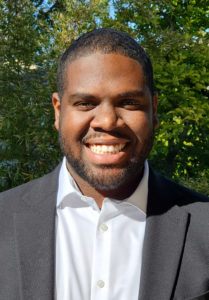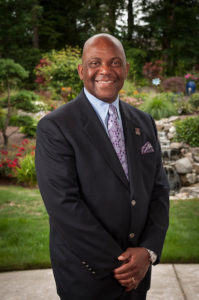In Conversation: Christopher Elliott, MBA ’22 and Clyde D. Walker, ’77

Christopher Elliott, MBA ’22
My name is Christopher Elliott and I am a 1st year full-time Foster MBA candidate. I am a first year diversity representative, a member of the consortium and an African American male.
Last month, I had a conversation with Clyde D. Walker, BBA’ 77, Chair of the Board of Directors at First Choice Health, and a member of the Foster Center for Leadership and Strategic Thinking Advisory Board, on his thoughts on the work of furthering inclusion and diversity at the Foster School of Business.
If you ever speak to Clyde, you don’t need to look at his LinkedIn page to know how impressive he is.
I first met Clyde Walker in a meeting that was meant as a brainstorming session with the goal of increasing the relationship between Black students and the faculty members of Foster. My first thought was that I did not know an alumni like him existed. He is a Black man with 40 plus years of experience, which includes more than two decades in the aerospace industry and multiple board seats. If you ever speak to Clyde, you don’t need to look at his LinkedIn page to know how impressive he is. When he speaks, you listen. He has a way of commanding a room, even virtually. He’s one of those people that makes a point and forces everyone on the call to nod in unison.
“I could be a crappy writer as a journalist or I could be a great writer in business.”
Clyde has undoubtedly had a very impressive career. However, the most interesting part of his story may be the beginning. He originally wanted to be a journalist while attending Sacramento State.

Clyde Walker, 77
However after pursuing a love interest led him into a class being taught by the world famous poet, Maya Angelou, he soon realized that maybe he wasn’t as good a writer as he once thought. From there, he switched his focus to business after receiving some advice from his colleagues.
“I could be a crappy writer as a journalist or I could be a great writer in business.”
I asked Clyde, “What do you wish the greater Foster community knew about Clyde Walker?” His first response was a blunt.
“That I’m here.”
He then went on to talk to me about how he was committed to helping students of color at Foster, and expressed frustration that Foster was not doing enough in terms of DEI initiatives. As someone who has worked on a number of initiatives, it is important to capitalize on those that want to help. We’re lucky to have someone like Clyde and if you take away anything from this post, have it be that you know that Clyde is here.
I asked him what he wished the greater Foster community knew about the Black community at Foster. His three short responses could not have been more perfect:
- How small it is.
- How undersourced it is.
- How spectacular it is.
On the topic of diversity efforts, Clyde believes “Diversity initiatives work when they are not about diversity…they work when they are about character and not about race.” I want to be clear as Clyde would be. He is not saying that you should not see color. What he is saying is that diversity initiatives work when EVERYONE is given a chance. They work when a Black employee is given just as many chances as a white one.
“I want us to have a chance to succeed or fail like everyone else.”
We spoke at length about diversity, but one thing he said will stick with me:
“I want us to have a chance to succeed or fail like everyone else.”
It is common for people of color to feel like they have to outperform their white counterparts by orders of magnitude. There is an innate fear that you have fewer chances and therefore must always go above and beyond to be seen as equal. As Clyde (and Chris Rock) put it, “We need the opportunity to suck.” We will have true equity when that fear of the uneven playing field is gone.
When I asked if diversity gotten better since Clyde began his career, his assessment was again blunt, but hopeful. “Not really…it’s just critical mass, you can’t keep us out forever.”
I talk about diversity every day. The climate of our country forces it but as a Black man at Foster, it’s a conversation that I don’t believe has the luxury of not being regularly had. Speaking with Clyde was a breath of fresh air. He provided practical insight and honest feedback on where our program is and where he believes our country is headed. This conversation took place just days after President Biden’s Inauguration, so when we spoke about politics, I could see hope in his eyes and hear joy in his tone. “What we’ve seen these last four years and on January 6th reminded us of the fear that certain leaders are feeling. They are terrified that their way of life is being uprooted and that fear is justified.”
